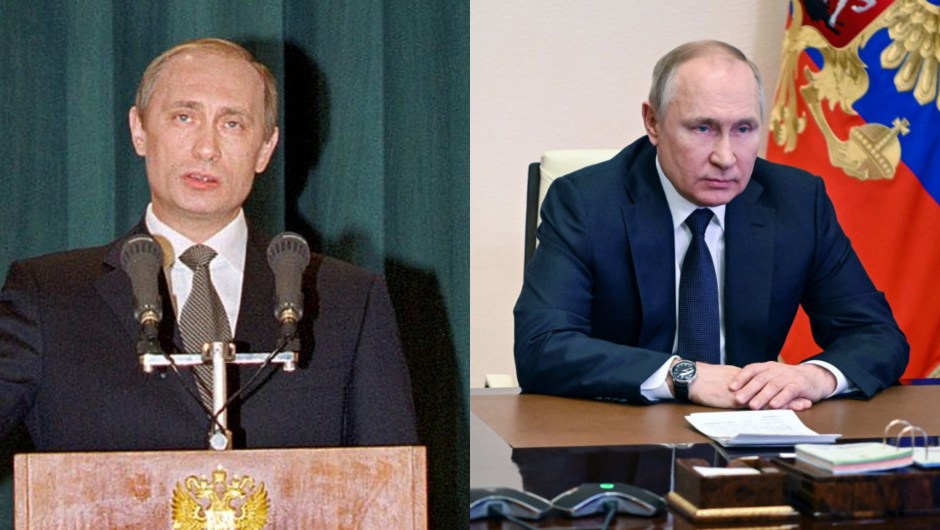Left: Vladimir Putin when he was first president in 2000. Right: Putin on March 3, 2022, during a meeting in which he said the "operation" in Ukraine was going "as planned." .
Editor's note:
Wendy Guerra is a French-Cuban writer and contributor to CNN en Español.
Her articles have appeared in media around the world, such as El País, The New York Times, the Miami Herald, El Mundo and La Vanguardia.
Among her most outstanding literary works are "Underwear" (2007), "I was never the first lady" (2008), "Posing naked in Havana" (2010) and "Everyone leaves" (2014).
Her work has been published in 23 languages.
The comments expressed in this column belong exclusively to the author.
See more at cnne.com/opinion
(CNN Spanish) --
I was born, grew up and matured with the same ruler.
My generation had to explain to itself, to its children and grandchildren, the incomprehensible, the maneuvers of Fidel Castro to govern Cuba for 49 years, from 1959 to 2008.
This saga, which began in the second half of the 20th century, does not end there, because when Fidel fell ill he was succeeded by his brother Raúl, who inherited the presidency of the Republic of Cuba from February 24, 2008 to April 19, 2018;
then, he remained as first secretary of the only party allowed on the island, the Communist Party of Cuba (PCC), and he continued there until last year 2021. Today, part of that family insists on continuing to dictate from strategic positions by "right of consanguinity ".
The Castros established a unique structure of repression, peppered with isolation, false independence, guerrilla warfare disguised as solidarity, abuse, exclusion, amnesia, censorship, repression, and political prisoners.
An infallible recipe that, until this minute, dictates the lives of millions of Cubans, born there or in exile.
Russia-Ukraine War: Breaking News, Invasion Analysis and News
In my country I learned that thoughtlessly leaving one dictator for another does not guarantee the salvation of a people, that participating in mock elections does not mean freely exercising your right to vote.
I learned that symbolic sympathies are not always legitimate, but illusions sown from political photogenicity, and that there is no dictator who can withstand a 60-year-old archive, because what was said today will be contradicted, prohibited, and even condemned tomorrow.
We Cubans live between the forbidden and the obligatory, and we are not the only ones.
Throughout history, the danger of a power beyond its limits has prevailed: dictators who manage to perpetuate themselves by changing the laws of a country, speaking on behalf of their people with threats, false votes, or simply without them.
The appearance of a dictator with such particular psychological characteristics is not a one-day thing.
A charismatic being is needed, willing to do anything, with a strong hand, who listens to himself, who manages to identify a credible enemy, real or phantasmagorical, who acts under the protection of certain foreign powers.
To keep his staging alive, a script is needed that includes fear, lack of information and certain economic-geographical characteristics favorable to seclusion.
Power is addictive, and the pleasure of a man perpetuated at the top can cost his contemporaries dearly.
For this reason, the party, the cabinet, their doctors, collaborators or simply those who accompany a leader, must be very attentive to their reactions, excesses, as well as their possible pathologies or disorders, such as Hubris syndrome, described by the scientist David Owen as that act in which a powerful character behaves with pride, arrogance and an exaggerated self-confidence that takes him to the limit of despising other people and acting against common sense.
It is very easy to take economic advantage of the self-absorption, the narcissism and the need of a being blinded by his hierarchy, to feed the desire of a delusional person who, little by little,
he loses the sense of time and the reasons why he was "the chosen one".
It is common to see how dictators cling to fundamentalism, independence, historical symbolism and disproportionate religious or ideological reasons.
At a secret Eastern European airfield, a multinational effort to ship weapons to Ukraine is moving at high speed
A president or prime minister is not a divine being, he is a public servant and that should never be lost sight of, because it is at that moment when the correlation of forces changes dramatically.
The people suffer first, then their neighbors and finally humanity.
Names like Daniel Ortega, Kim Il-sung, Chiang Kai-shek, Khalifa bin Salman Al Khalifa, Yumjaagiyn Tsedenbal, Moammar Gadhafi, Francisco Franco, Porfirio Díaz, Iósif Stalin, Saddam Hussein, Yahya Jammeh, among many others, have written deplorable pages in the history of their countries and incidentally, dotted the world with their nefarious actions.
That is also the case of Vladimir Putin, who has the perfect ingredients so that, in the worst of narratives, his mandate ends with a sword of Damocles hanging over our heads: the close possibility of a nuclear war.
Let's do some history.
Following the resignation of Boris Yeltsin, Vladimir Putin, formerly director of the Federal Security Service (FSB) – successor to the KGB – and secretary of the Security Council, became the new president of Russia on December 31, 1999. His first stage It covers from 2000 to 2004, but he was re-elected for a second term, from 2004 to 2008. As the Russian Constitution of 1993 stated that a president can only be re-elected twice consecutively, in December 2007 Putin appointed Dmitri Medvedev as his successor, who won the national elections in 2008, naming Vladimir Putin as Prime Minister, to whom some psychological spring made him think that Russia urgently needed "the support of his modest efforts", and after the brief passage of Dmitri Medvedev from 2008 to 2012,
he ran for the next election and won amid allegations of electoral fraud.
In 2014, he intensified the conflict with Ukraine when Putin sent troops to Crimea and two weeks later Russia had annexed the territory that until then was an autonomous region.
On March 18, 2018, with 76.7% of the votes, Putin is again elected president of Russia for the period that ends in 2024. In 2021 he made sure that he can continue to govern beyond that date, since he approved a law that will allow him to run for two more terms.
Power after power seems infinite, and not all leaders are content with four, six, or eight years on the bench.
It is evident that this perpetuity harms us all, since it accentuates human defects, corrupts and blinds, compels absurd expansions, useless wars that lead to unexpected ends.
Faced with this syndrome of perpetuity and before collaborating, supporting or remaining indifferent to the destructive and infinite power of these characters that assail history, we must seriously ask ourselves: kings or presidents?
wendy war




/cloudfront-eu-central-1.images.arcpublishing.com/prisa/5U35PX4BABDO5IHUZOPPKARVSU.jpg)